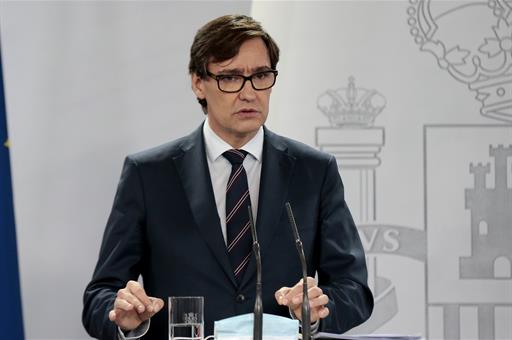Salvador Illa specifies reinforcements to Foreign Health Service as from 21 June for the re-opening of borders with European Union and Schengen Area
News - 2020.6.19
According to the information provided by the minister at the press briefing, the Foreign Health teams will initially be reinforced with a first contingent of 100 extra workers from auxiliary companies and other organisations that provide services in ports and airports, thanks to an agreement with the Ministry of Transport, Mobility and Urban Agenda.
Salvador Illa recalled that, as from Sunday, people arriving in Spain will be subject to primary controls. On the one hand, they must fill in a localisation form, known as a Passenger Location Card (PLC), which is already in use. This includes location details of the person as well as information as to whether they have suffered from COVID-19 and in what circumstances. This will be followed by a temperature control and finally a visual control.
If any of these three controls are not passed, a doctor will examine the person who will be referred to the health services of the destination autonomous region, explained the minister.
In order to facilitate fluid transit through airports, the temperature control that has been performed on passengers on flights arriving from other countries since 15 May will be performed by thermal-imaging cameras. Furthermore, in the coming weeks, the location document, which to date has been filled in on the plane and handed in once the passenger arrives at the destination, will be digitalised.
The Minister for Health, Salvador Illa, and the Minister for Transport, Mobility and Urban Agenda, José Luis Ábalos, will visit Adolfo Suárez Madrid-Barajas Airport on Saturday.
European purchase of vaccines
The minister also announced that Spain has signed up to the purchase of vaccines to be carried out by the European Commission, through the so-called COVID-19 Inclusive Vaccines Alliance. Spain will form part of its managing committee and of the negotiating team. "We welcome the chance to form part of this because purchasing will be carried out with a European focus to guarantee equal access", he highlighted.
Finally, Salvador Illa announced that the regional governments have finalised the process to update the figures on those who have died, and underlined the "exercise in transparency" of the Ministry of Health "from the outset".
The figures on those people who have died from COVID-19 are contained in the individualised data collection system - Sivies - such that the Ministry of Health, through the Health Alert and Emergency Coordination Centre (Spanish acronym: CCAES) is able to display these figures. He announced that the regional authorities have recorded a total of 28,313 fatalities to date. The update will be published each afternoon, as from 5 pm, on the web page of the Ministry of Health.
Fast and effective surveillance
Salvador Illa underlined that Spain is familiar with the global scope of the epidemic thanks to the seroprevalence study, which finished its third wave this week and has shown that COVID-19 has affected some 5% of the population to date. The study, "with a great international repercussion" will shortly be published in the medical journal The Lancet.
Lastly, the minister praised the functioning of the surveillance system, which has led to the detection of 34 outbreaks of the coronavirus since 11 May and to "swift and effective action to control them". He explained that at this time, there are nine active outbreaks, with 92 people affected. "They are all under control", he stressed.
As part of the detection work, until 11 June, 3,061,738 PCR tests have been performed "with a daily average of 40,000", highlighted the minister.
Non official translation





